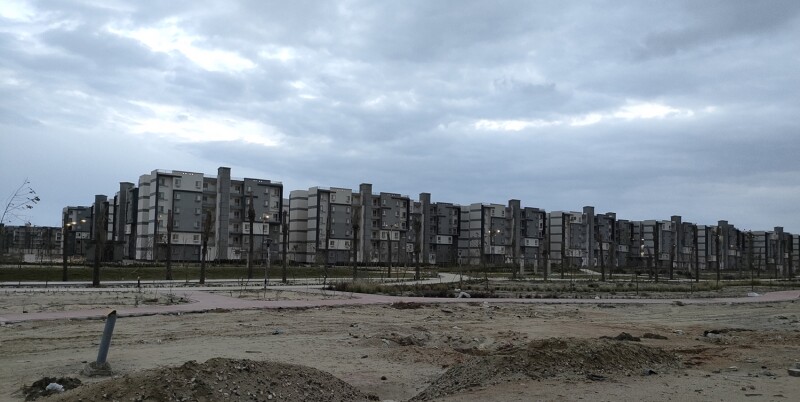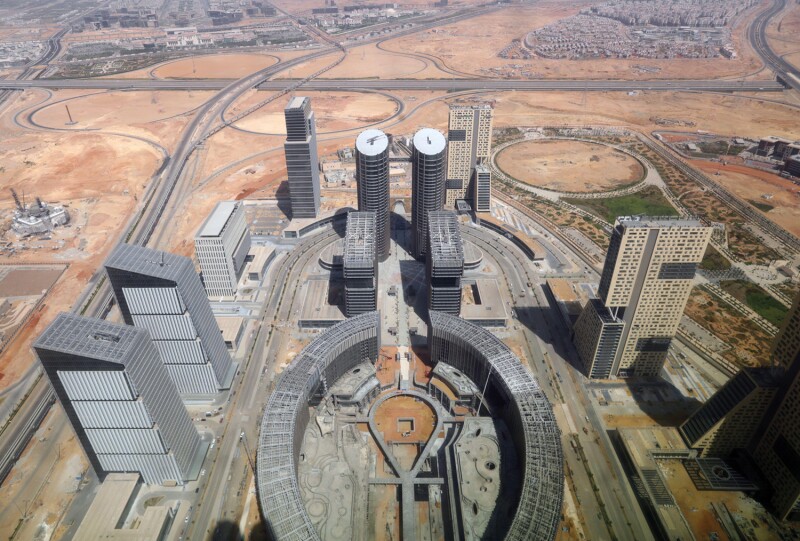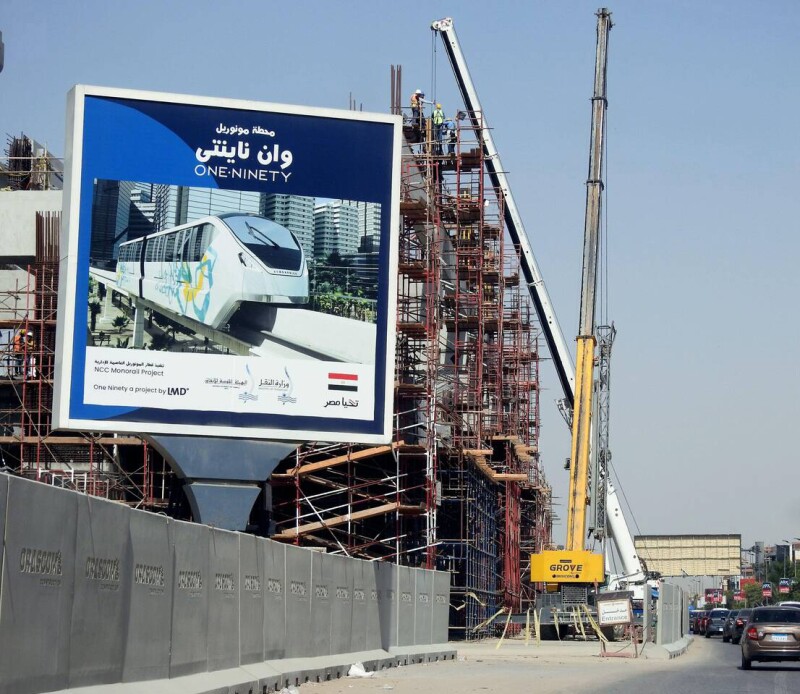For many decades, the old Arabic expression Umm Al-Dunya or ‘Mother of the World’ has underpinned how the country itself and the wider Arab world thinks of Egypt. The phrase encompasses the weight of Egypt’s long history, its cultural influence and its political importance.
Through recent electoral and economic uncertainty, this belief in Egypt’s pivotal contributions to the region’s past and future have given investors faith that it will weather the current round of challenges and come through stronger.
Many of the issues facing Egypt are not the country’s fault. The Covid-19 pandemic was a colossal economic blow. Heavily reliant on imports of food and other commodities, Egypt has struggled with the rampant inflation exacerbated by the war in Ukraine. Perhaps Egypt’s most pressing issue is a foreign exchange crisis brought on by a current account imbalance. The lack of foreign currency circulating is seriously dampening economic activity.
“The big question is around the dollar exchange rate,” says Tarek Abdel Rahman, managing partner of Compass Capital in Cairo. “There is a 25%-30% difference between the bank rate and the black market. So if you are seeking a return on investment then this is a huge problem.”
Egypt has traditionally balanced its import/export imbalance through tourism, remittances, Suez canal receipts and foreign investment. Each of these sources may have taken a serious hit in recent years, but several are showing signs of recovery. Tourism has been dented by terrorist attacks and most recently Covid, but visitor numbers are now higher than they were pre-pandemic.
The tourism ministry reported that 11.7m visitors arrived in 2022, attracted by simplified visa procedures and a growing array of destinations. In April this year, tourism numbers hit a record monthly high of 1.35m. Research company BMI expects tourism revenue to hit $14.4bn in 2023, up from $13bn in 2022. The government is hoping to attract 30m tourists a year by 2028, which will require a dramatic expansion in hotel capacity.
The picture also looks brighter on canal receipts. Recovering global trade, combined with severe supply chain shortages, have pushed up the canal’s takings to record highs. In the second half of 2022, remittances fell 23% to their lowest level since 2016, according to central bank data. But this is largely due to the economic uncertainty and dual exchange rate. The government’s plan to address both will allow remittances to return.
FDI rising
When it comes to investment, there are also positive signs. UN data show foreign direct investment (FDI) more than doubling in 2022, to $11.4bn. There is huge scope for foreign capital flows to continue to reach new highs.
Before the pandemic, government investment was highly focussed on mega-projects, some of which are unlikely to generate immediate cash flow. This not only consumed large amounts of foreign currency but also crowded out the private sector and foreign investors.
One silver lining from the current set of economic challenges is that they are prompting vital reforms and policy changes that will bring FX inflows and private sector dynamism back to Egypt’s economy.
“We’ve been seeing encouraging signs,” says Rahman. “There have been appointments of investor-friendly people to certain important institutions and the investment authorities are working overtime to make investors’ lives easier.”
In December 2022, President Abdel Fattah el-Sisi approved a transformational state ownership policy that outlines the government’s vision for the future role of the state in the economy. This includes raising the participation of the private sector in public investments from 30% to 65% within three to five years.
Enhancing private sector participation should lead to higher growth — the government wants GDP to grow at 7% to 9% — boost exports and provide new, higher paying jobs for a growing population.
Under the new policy, the state will exit sectors including passenger and cargo transport, food and beverages, retail, and commercial insurance.
Swathe of privatisations
Hussein Abaza, CEO of Egypt’s Commercial International Bank, points to government plans to sell or list its stakes in 32 state-owned firms, in a privatisation programme covering a range of sectors from tourism and energy to banking and insurance.
Government holdings of United Bank of Egypt, Banque du Caire and Arab African International Bank are all scheduled to be sold. “Selling state assets will enable the Egyptian economy to weather the crisis inflicted by the Russia-Ukraine war, since the war has sparked a huge outflow of foreign investments,” he says. “Reform policies will reduce the state’s involvement and increase transparency in state-owned enterprises.”
This privatisation approach is also likely to be crucial in unlocking additional funding from the International Monetary Fund and the country’s Gulf allies. This funding has been delayed until certain reforms were implemented — not least the introduction of a flexible exchange rate.
The IMF wants to see solid progress, while the Gulf states want to make a return on any assistance, which means the ability to buy state-owned assets.
Analysts say the Egyptian authorities are understandably waiting for the initial inflow of foreign currency from asset sales before adjusting the exchange rate. This will enable them to adjust the value of the Egyptian pound from a stronger position.
“This would also hopefully reduce the amount of adjustment needed, limiting the inflationary impact on the population,” says Trevor Cullinan, director at S&P Global Ratings in Dubai.
In short, privatisation is to raise foreign currency, allowing a currency adjustment that would in turn unlock a new wave of donor funding. All this should go a long way to calming domestic and international investors, especially at a time of broader unease across emerging markets.
S&P analysts note that, under its agreement with the IMF, the government aims to raise $4.6bn from asset sales in the 2023-24 fiscal year, having broadly achieved its initial target by raising $1.9bn over the six months to June 2023.
Together with the Gulf governments’ pledge to invest in Egyptian companies, the government has a plan that should have real impact.
Strong fundamentals
Egypt also benefits from a host of strong fundamentals that will support investment. One is a strong, well-regulated banking sector able to cope with the rapid rise in interest rates and inflation.
“Banks are the backbone of the economy and we are blessed with very strong banks and very strict regulations on what banks are allowed to do,” says Rahman.
The banks do not rely on foreign funding nor have exposure to risky financial products. BMI says the average Tier 1 capital adequacy ratio across the banking sector is above 17% — higher than international standards. Banks have enough reserves to cover the expected rise in non-performing loans, and BMI analysts expect payment facilities to prevent a significant deterioration in asset quality.
“Banks like CIB responded to high interest rates by issuing foreign and local certificates of deposit with varying annual interest rates,” says Abaza at CIB. Such certificates are intended to support local currency saving and are in line with central bank efforts to strengthen the pound and stop the black market sale of dollars.
“The Central Bank of Egypt is taking the necessary steps to safeguard people’s local currency savings and establish a price for the Egyptian pound against the US dollar,” Abaza says.
BMI expects the central bank to devalue the currency in the third or fourth quarter this year, hoping to relieve the main source of pressure on the banking system.
“Egyptian expatriates will resume remitting money through official channels, while receding FX risk will encourage portfolio investors to re-enter the Egyptian debt and equity markets,” the rating agency said in an August outlook.
FDI flows will also improve the financial sector’s net foreign asset position, which hit a record low of minus $27.1bn in June, according to BMI. It expects Egyptian banks’ net foreign asset position to improve by the end of this year or early 2024.
Egypt’s financial sector was already entering a new phase of dynamism even before the government announced its privatisation plans. The authorities have made fintech a priority, not least to boost financial inclusion.
Looking at the numbers, Egypt is a financial start-up’s dream. It is a country of over 100m people with mobile penetration of almost 95% and internet use north of 72%. But financial inclusion is still less than 65% for adults, and under 60% for women. The possibilities are immense, and fintechs are already making inroads.
In 2017, the authorities surveyed how many fintech firms and payment service providers there were in the country — they found 38. In 2022, that number had grown to 199, of which almost a quarter had offices overseas.
Over the same period, venture capital and private equity investment in fintechs rose from $15.5m to almost $800m. More than half of firms in 2022 said they were planning to expand in the next 12 months, with key markets including the Mena region, Turkey, Pakistan and parts of Africa.
Payments and remittances account for more than a third of the fintechs, but the alternative lending, data analytics and business-to-business marketplace segments are expanding quickly.
Egyptian banks and global lenders like HSBC and Standard Chartered are enthusiastically partnering with nimble start-ups to help tap into underserved client groups like small and medium sized enterprises.
Health and housing
Egypt’s population of almost 110m and its solid long term growth outlook mean there are huge opportunities for investors, both domestic and international.

The real estate market has long been one of the most attractive options. Almost one fifth of Egypt’s population is aged between 10 and 19, and there are around 26m people aged 24 or below. This massive pool of young people will drive demand for retail space and later housing.
The government is building an array of large real estate infrastructure projects — including the New Administrative Capital, New Mansoura City and New Alamein City — that blend residential, commercial and industrial spaces.

“If you look at the last 10 years, real estate has returned around 22% per year in terms of total investment return,” says Rahman. “Nothing else even comes close, and real estate also acts as a hedge against inflation.”
Healthcare is another sector analysts expect to be very attractive to investors, and which enjoys the same fundamental support as housing. Egypt aims to provide universal health coverage as part of its Vision 2030 strategy, but private hospitals and care providers are becoming increasingly important.
The government has opened state-affiliated hospitals to private investment. Healthcare providers have continued to expand despite the economic difficulties.

In May this year, outpatient provider Dawi Clinics announced it would open 30 new clinics with E£250m ($8.1m) raised in a funding round led by National Bank of Egypt’s AlAhly Capital Holding, with a co-investment by the Egyptian-American Enterprise Fund. Egypt is an increasingly popular destination for medical tourism across the region.
Not only is Egypt’s population the largest in the Middle East and North Africa, but it is forecast to grow by almost 50% by 2050. For investors in the education sector, this puts the country front and centre of any growth strategy.
Enrolment rates are higher than the global average. The population places incredible importance on education, and private schools are among the priorities for households even on modest incomes. “It’s an industry that a lot of corporations have entered over the last few years — especially universities and even schools,” says Rahman.
Egypt has had a difficult year, but there is cause for optimism that a new generation of targeted reforms will allow the country and its highly educated, industrious population to reach their true potential.
Egyptian state companies scheduled for partial privatisation
FINANCE
Banque du Caire
United Bank of Egypt
Arab African International Bank (AAIB),
Misr Life Insurance
Misr Insurance
INFRASTRUCTURE
Elnasr Housing and Development
Maadi Company For Development & Reconstruction
El Mosktabel for Urban Development,
Misr Concrete Development
CHEMICALS AND MANUFACTURING
Helwan Fertilizers
Wataniya Company for the Sale and Distribution of Petroleum Products
Egyptian Polypropylene & Polypropylene (EPP)
Chemical Industries Development Company (CID)
Paints and Chemical Industries (PACHIN),
Alamal Alsharif Plastics
The Egyptian Ethylene and Derivative Company (ETHYDCO)
Egyptian Linear Alkyl Benzene (ELAB)
METALS AND MINING
El Nasr Mining
Egyptian Drilling Company (EDC)
Sinai Manganese Company
Egyptian Ferrous Alloys Company
TRANSPORT AND LOGISTICS
Canal Company for Mooring and Lights
Port Said Container & Cargo Handling Company (PSCCHC)
Damietta Container and Cargo Handling Company (DCHC)
OTHER
Salhia Investment and Development Company,
Hotels owned by the Public Sector Ministry
Misr Technology Service (MTS)
Misr Pharma.
Safi Waters
ENERGY
Gabal El Zayt Wind Power Plant
Zafarana Wind Farm
Beni Suef Power Station
